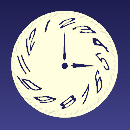

Married for thirty-two years, spouse deceased, raised twin sons, had a twenty-four year career in education, currently have a part-time play therapy/counseling private practice.
In undergraduate and graduate school I remember staying up late and hating and avoiding early morning classes. I did not know I had DSPS for decades but it really started causing me problems when I began working M-F day jobs. I went to several doctors and psychologists for what I thought was insomnia, anxiety and depression. Early on I started taking prescription medicine to help me sleep and to decrease anxiety and depression. In order for me to get 5-6 hours of sleep I had to take medicine and was able to get up for work mainly because my husband served as a second alarm system. When I was younger I frequently existed during the work week on four hours of sleep. In my early thirties I had twins. I was able to manage getting a graduate degree, raise children with my husband and have a career through sheer motivation and drive. I was routinely sleep-deprived, got in a couple of fender benders and I did not have much immunity to infection. I was also diagnosed with breast cancer at age thirty-six. I have no regrets for the accomplishments and an overfull life, but a caveat to having children is that if one has DSPS, a really supportive partner and perhaps loving grandparents and/or other relatives are vital for adequate childcare and to have some time for the marriage/partner relationship. I was able to retire from public education just in time as I was physically unable to get to work on time for those last couple of years. My body just could not do it anymore.
It was a revelation when I found out I have DSPS, not insomnia, and much of the anxiety and depression eased when I could sleep on my natural schedule which is usually 6 a.m.-2 p.m. The doctors and therapists I saw along the way seemed unaware that I had a circadian rhythm disorder. I actually diagnosed myself from descriptions of DSPS on the internet and the sleep doctors agreed. Friends and family also had difficulty understanding and accepting this syndrome/disorder. As I became more accepting of it myself, with the help of the the niteowl e-mail list, which has its home at circadiandisorders.org/list, I became more empowered to calmly tell people how it was and is for me and I ceased agonizing over whether they could understand.
Luckily, for the past seven-eight years I have been able to work as little or as much as I want, so life has become much easier and peaceful for me. The hardest part of DSPS are the long nights and missing out on most of the day and all that entails. There is a lot of social isolation and loneliness. Melatonin has little effect on me and I have not given light therapy a good try so I do not know if I could significantly change my schedule or even push it back by a couple of hours. If I can sleep on my normal schedule I feel good and that is the best thing about losing the day job, to realize I can feel like a normal person. It is strange to have this disorder as I am a rarity, I look "normal" and people mostly cannot relate, but there is no cure so I try to make the best of it.
I had to go to three doctors in the same city, over about 12 years to find one who seemed competent. Incidentally this doctor was board certified. So if at first/second you have a lousy experience with an incompetent doctor do not give up. There are competent doctors out there but sometimes it takes persistence and effort to find one. This doctor said he tells college-age people with DSPS not to fight it, to find work that is in line with their natural sleep schedule as it is very difficult to change.